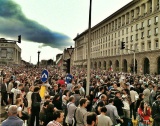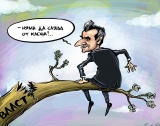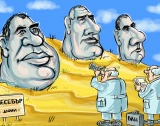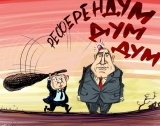АБОНАМЕНТ ЗА НОВИНИ [X]
The Economist: Ще променят ли нещо протестите?
 08:41 | 20.09.2013
08:41 | 20.09.2013 1297
1297  коментари 0
коментари 0
Под заглавие "Раждането на едно гражданско общество" списание "Икономист" търси отговор на въпроса дали всекидневните антиправителствени протести на българите ще имат дълготраен ефект.
За протестиращите Делян Пеевски е станал символ на всичко погрешно в българската политика, пише "Икономист", като добавя, че неговата Нова българска медийна група (НМБГ) подкрепя всяко правителство на власт, променяйки съюзите си за един ден, а зад нея стои влиятелната Корпоративна търговска банка на Цветан Василев, в която държат авоарите си повечето държавни компании. Макар че Пеевски не е единственият олигарх в България с тесни връзки с държавата, той е най-видимият благодарение на връзката между политическата му кариера, медийната група и банката, посочва изданието. Изданието цитира министъра на вътрешните работи Цветлин Йовчев, който признава, че "хората не усещат да има достатъчно справедливост". Според него кризата в България, която изглежда постоянна, е резултат по-скоро от дългосрочно недоволство, отколкото от решенията на сегашното правителство. Йовчев настоява, че правителството не е олигархично и че България е функционираща демокрация. Протестите ще стихнат, смята той, когато хората се убедят, че реформите на правителството носят промяна. На противоположното мнение обаче е президентът Росен Плевнелиев, който вижда протестите като позитивни и мисли, че изборите биха довели до промяна.Дали протестите в България ще променят нещо?
Оптимистите смятат, че протестите са създали нова политическа среда и че на българските политици вече няма да може безнаказано да им се разминава лошото управление или клиентелизмът. Песимистите казват, че правителството ще оцелее, цинизмът ще вземе връх и България ще остане бедна и затънала в корупция. Ако нещата останат същите, младите българи ще продължат да бягат в чужбина, понеже не виждат възможности у дома, а българското общество ще остане разделено, както е сега: 51 на сто от подкрепят протестите, 33 процента - контрапротестите, организирани от правителството, а 16 на сто - нито едните, нито другите, според неотдавнашно социологическо проучване. Ето и пълният текст на публикацията в The Economist: Birth of a civil society FOR almost 100 days now thousands of Bulgarians have taken to the street every evening, in Sofia and other big Bulgarian cities, to protest. Their target is the government of Plamen Oresharski, the prime minister, which is only two weeks older than the demonstrations themselves. The protesters belong to all strata of society though the majority seem to be young, educated and middle-class. Mothers arrive with buggies and children of all ages in tow, executives in suits drop by after work. In Sofia they meet in front of the presidential palace at 7pm and slowly walk to parliament, accompanied by whistles, drums and cries of “Resign!” Justine Toms, a Bulgarian online marketing specialist, was part of the very first protest. On some days 50,000 to 60,000 people protested in Sofia, she says proudly. The demonstrators have their own website, Facebook page, newspaper (called Protest and distributed as a PDF file), and a Twitter hashtag, #DANSwithme—a play on the acronym of the State Agency for National Security, the secret service. The Twitter hashtag alludes to the nomination (later reversed by parliament) of Delyan Peevski, a controversial 33-year-old media mogul, as head of DANS, which was the catalyst for the protest. Mr Peevski had been sacked from a previous Socialist-led government and prosecuted on corruption and extortion charges of which he was eventually cleared. He does not directly own any companies—his mother is the official head of a vast media empire—but he is widely known to be in control of high-circulation newspapers, popular television channels and news websites. For protesters, Mr Peevski has become a symbol for everything that is wrong with Bulgaria’s politics. His New Bulgarian Media Group (NBMG) backs whichever government is in power, changing allegiances from one day to the next. Behind NBMG is the powerful Corporate Commercial Bank (KTB), owned by Tsvetan Vassilev, the go-to bank for most state-owned companies. Though Mr Peevski is not Bulgaria’s only oligarch with close connections to the state, he is the most visible, thanks to the circular link between his political career (he is still an MP), his media group and a bank stuffed with state money. “People do not feel enough justice is done,” admits Tsvetlin Yovchev, the interior minister. In his view Bulgaria’s seemingly permanent crisis is the result of long-term discontent rather than his government’s decisions. Resignation of the entire government, the protesters’ most pressing demand, would not change much, he says, as polls indicate that fresh elections would not yield very different results from the previous ones. Mr Yovchev insists that the government is not oligarchic and that Bulgaria is a functioning democracy. The protests will calm down, he thinks, when people realise that the government’s reforms are bringing about change. His main focus is the fight against organised crime, the protection of national security and reform of the interior ministry’s bloated bureaucracy and the inefficiency of its operations. However, Rosen Plevneliev, the president, takes a different view. He sees the protests as positive and thinks that elections could lead to change. “They are never copy and paste,” he says. In Mr Plevneliev’s view the crisis is economic as well as a step on the unfinished journey to democracy. He says the strong network of oligarchs is the main reason why Bulgaria is not yet a true European democracy. With such opposing views, Mr Plevneliev and Mr Oresharski’s team are at loggerheads. Mr Oresharski has accused the president of “grossly interfering with the executive branch with a series of unbalanced and biased actions”. Media outlets connected to NBMG have started what Mr Plevneliev calls a vicious smear campaign against him; there is talk in Sofia that the prime minister wants the president impeached. Even so, the president sees reasons to be hopeful: “2013 is the year of civil society in Bulgaria,” he says. Will the protests make a difference? The protesters have dwindled in number since the summer break, which could be a lull or the start of something more permanent. Optimists think that the protests have created a new political environment and that Bulgaria’s politicians will no longer be able to get away with mismanagement or clientelism. Pessimists say that the government will muddle through, cynicism will prevail and Bulgaria will remain impoverished and riddled by corruption. Reflecting some EU members’ concern about Bulgaria, the German and the French ambassador in Sofia recently published a joint statement warning that “the oligarchic model” is incompatible with EU membership. Daniel Smilov of the Centre for Liberal Strategies in Sofia thinks the government should have resigned. The lack of a resignation, he says, “creates a moral hazard that you can get away with everything”. If things remain the same, young Bulgarians will continue to flee abroad, because they do not see opportunities at home. Bulgarian society will remain divided, as it is now: 51% of those surveyed support the protests, 33% back the counter-protests orchestrated by the government and 16% neither, according to a recent poll by Alpha Research. After a scorcher of a summer, Bulgarians can expect a hot autumn. Резюме на български език: БНР| Tweet |
|
Още от рубриката
БЮЛЕТИН НА EconomyNews.bg













